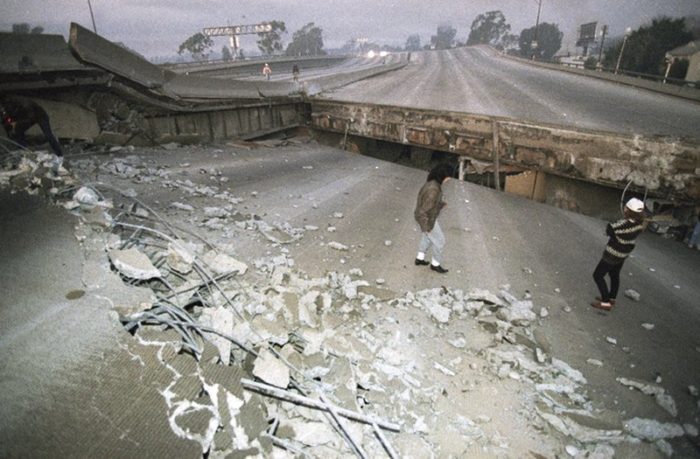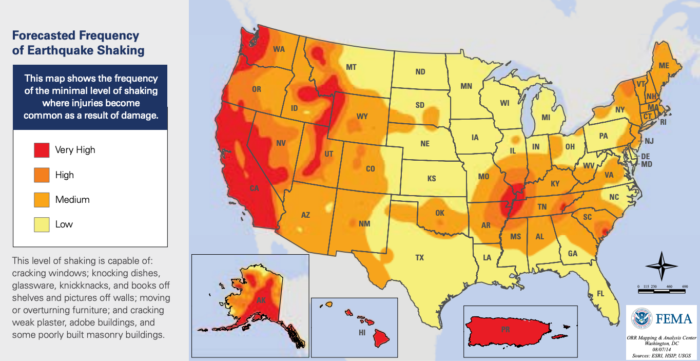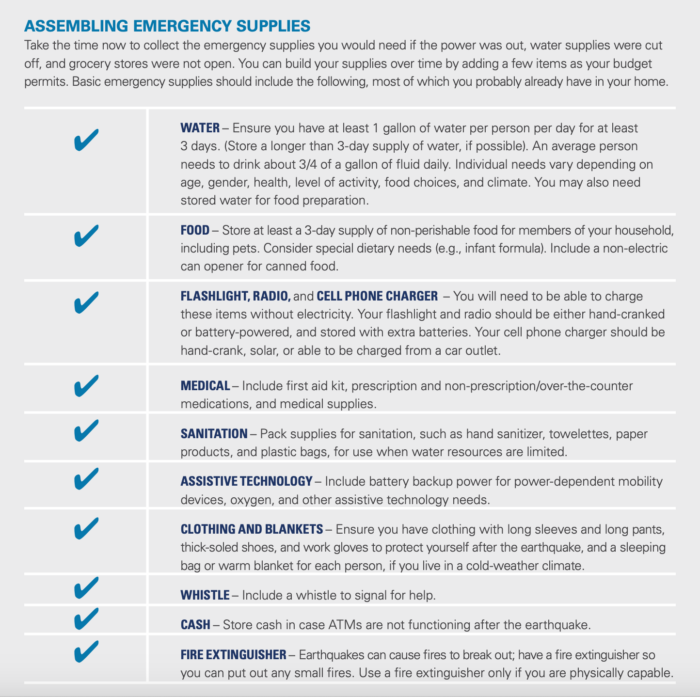
How to Prepare for an Earthquake [+ Essential Emergency Supplies You Need!]
Could an earthquake occur near you? You may be surprised. Just in case, here’s what I’ve found on how to prepare for an earthquake.
Chances are you’re reading this because you’ve either seen the recent news, or if you’re near the epicenter, you’ve felt the actual tremors.
But just in case this is all news to you, Southern California is experiencing its strongest series of earthquakes in more than 20 years, including a 7.1 magnitude earthquake occurring near Ridgecrest, CA.
While most earthquakes don’t necessarily warrant extreme measures like the bugging out we discuss at length on this site, it still makes sense to be adequately prepared should a big one hit.
This way you have options to be safe and relatively comfortable should you choose to stay and “bug in…”
Or if it’s really bad…
You have the means to bug out until the dust settles and things begin to return to normal.
If you’ve been on earth awhile like I have, you may recall the devastating 6.7 earthquake that hit the San Fernando Valley region. Dozens were killed and thousands injured in one of the worst earthquakes the lower 48 states has experienced in recent memory.

Fortunately, this recent one wasn’t as catastrophic.
But experts are saying more are probably on their way — and soon…
WHEN COULD THE NEXT EARTHQUAKE OCCUR?
In a recent AP interview, Lucy Jones, a seismologist at the California Institute of Technology and a former science adviser at the U.S. Geological Survey says there is “about a 1-in-10 chance that another 7.0 quake could hit within the next week,” and chance of a 5.0-magnitude quake “is approaching certainty.”
Now, if earthquakes are “old hat” for you and you’d like to jump to the list, feel free to scroll on down until you see the checklist.
For everyone else, let’s get into it…
First, let’s ask what seems to be on everyone’s mind:
COULD AN EARTHQUAKE OCCUR NEAR ME?
Other than wondering how bad it was and if anyone was hurt, this is the first question that went through my mind when I heard the news of another earthquake.
THE BIG FAULT LINE ALMOST NOBODY TALKS ABOUT
Being landlocked, smack dab in the middle of the country, one would think the main natural disaster threats we’d encounter are tornadoes, droughts and flooding.
While those are certainly the most common occurrences around these parts, it turns out those of us in the midwest aren’t completely in the clear either when it comes to earthquakes.
I discovered that firsthand when we felt tremors from as far away as Oklahoma back around 2010.
Even though these tremors were minimal in comparison to what occurs at the earthquake’s epicenter, it still makes ones sit up and take notice when the house shakes and the drinking glasses cling together.
It was around that same time I was again reminded of the New Madrid Fault Line running up through Arkansas into Southern Missouri, Tennessee, Kentucky, and Southern Illinois.
I’d always heard in school about an earthquake along the New Madrid Fault in the early 1800s that caused the Mississippi River to change course and direction… but being a kid I never really gave it much thought.
Things are a bit different now that I’ve grown a bit older and wiser.

Earthquake Zones in the United States Image Source: FEMA.gov)
As you can see, the major fault zones are indicated in the above graphic by big red blotches.
So how does it look for you?
Are you and your loved ones in the clear?
If not, keep reading to discover what the experts say you can do to prepare for an earthquake should one visit your neck of the woods…
WHAT IS AN EARTHQUAKE?
According to FEMA, an earthquake is “the sudden, rapid shaking of the earth caused by the breaking and shifting of subterranean rock as it releases strain that has accumulated over a long time.”
Initial mild shaking may strengthen and become extremely violent within seconds. Additional earthquakes, called aftershocks, may occur for hours, days, or even months. Most are smaller than the initial earthquake but larger magnitude aftershocks also occur.
WHEN DO EARTHQUAKES OCCUR?
As we’ve just seen, earthquakes can happen at any time of the year and occur without warning.
WHERE DO EARTHQUAKES OCCUR?
All U.S. states and territories are at some risk for earthquakes as well as across the entire globe. The risk is higher in identified seismic zones.
WHAT ARE THE POTENTIAL IMPACTS OF EARTHQUAKES?
Larger earthquakes may cause deaths, injuries, and extensive property damage.
It’s important to note that most casualties and injuries during an earthquake occur when: people fall while trying to walk or run during the shaking; when they are hit by falling, flying, or sliding household items or non-structural debris; and/or when they are struck or trapped by collapsing walls or other parts of the building.
Transportation, power, water, gas, and other services may also be disrupted. In some areas, shaking can cause liquefaction— when the ground acts more like a liquid. When this happens the ground can no longer support the weight of a building.
In coastal areas, as we’ve seen in recent years, earthquakes under the sea floor have been known to cause tsunamis.
SO HOW SHOULD YOU PREPARE FOR AN EARTHQUAKE?
1 | BEFORE AN EARTHQUAKE: PREPARE
As with any emergency, it is always best to take action now, before an earthquake hits.
- Survey your house and surroundings making sure to secure items that might fall and cause injuries (e.g., bookshelves, mirrors, light fixtures).
- Practice with your family how to Drop, Cover, and Hold On by participating in a ShakeOut earthquake drill (www.ShakeOut.org).
- Safely store critical supplies and documents.
- Plan how you will communicate with family members in times of emergency.
2 | DURING AN EARTHQUAKE: SURVIVE
As soon as you feel the shaking,
- DROP down onto your hands and knees so the earthquake doesn’t knock you down.
- COVER your head and neck with your arms to protect yourself from falling debris. If you are in danger from falling objects, and you can move safely, crawl to a safer place or seek cover (e.g., under a desk or table).
- HOLD ON to any sturdy covering so you can move with it until the shaking stops.
3 | AFTER AN EARTHQUAKE: RECOVER
When the shaking stops, before you move, look around for things that might fall or for dangerous debris on the ground.
- If you are in a damaged building and there is a safe way out through the debris, leave and go to an open space outside, away from damaged areas.
- If you are trapped, do not move about or kick up dust.
- If you have a cell phone with you, use it to call or text for help.
- Tap on a pipe or wall or use a whistle, if you have one, so that rescuers can locate you.
- Once safe, monitor local news reports (e.g., radio, TV, social media, and cell phone text alerts), for emergency information and instructions.
ASSEMBLING EARTHQUAKE EMERGENCY SUPPLIES
Hopefully the above steps seem simple enough to recall even when in the midst of chaos.
To go along with that, I’ve also provided a screenshot of the supplies FEMA recommends below.
In case the image is difficult to read on your device, I’ve also typed out their recommendations for you below.
As FEMA states, “take the time now to collect the emergency supplies you would need if the power was out, water supplies were cut off, and grocery stores were not open.
You can build your supplies over time by adding a few items as your budget permits. Basic emergency supplies should include the following, most of which you probably already have in your home…”
Here is a printer-friendly guide for Earthquake Preparedness FEMA recommended emergency supplies to have on hand in the event of an earthquake.
Should you need to evacuate your home or place of work in an emergency, check out our comprehensive Bug Out Bag Checklist, here: https://bugoutbagacademy.com/free-bug-out-bag-list/
WATER
You don’t want to be one of the people caught spending hours in line waiting for a case of water from the Red Cross just to have to do it all over again the next day.
Ensure you have available at least 1 gallon of water per person per day for at least 3 days. (Store a longer than 3-day supply of water, if possible).
An average person needs to drink about 3/4 of a gallon of fluid daily. Individual needs of course vary depending on age, gender, health, level of activity, food choices, and climate.
Keep in mind you will also need stored water for food preparation.
FOOD
Store at least a 3-day supply of non-perishable food for members of your household, including food for any pets. Consider special dietary needs (e.g., infant formula). Include a non-electric can opener for canned food should you have a power outage.
FLASHLIGHT, RADIO, & CELL PHONE CHARGER
You will need to be able to charge these items without electricity. Your flashlight and radio should be either hand-cranked or battery-powered, and stored with extra batteries. Your cell phone charger should be hand-crank, solar, or able to be charged from a car outlet.
MEDICAL SUPPLIES
Include first aid kit, prescription and non-prescription/over-the-counter medications, and medical supplies.
SANITATION
Pack supplies for sanitation, such as hand sanitizer, towelettes, paper products, and plastic bags, for use when water resources are limited.
ASSISTIVE TECHNOLOGY
Include battery backup power for power-dependent mobility devices, oxygen, and other assistive technology needs.
CLOTHING & BLANKETS
Ensure you have clothing with long sleeves and long pants, thick-soled shoes, and work gloves to protect yourself after the earthquake, and a sleeping bag or warm blanket for each person, if you live in a cold-weather climate.
WHISTLE
Include a whistle to signal for help should you need it.
CASH
Store cash in case ATMs are not functioning after the earthquake. I recommend having enough on hand to put you and your family up in a reasonable hotel for a few days should you find yourself vacating your home.
FIRE EXTINGUISHER
Earthquakes can cause fires due to leaking gas mains, severed electrical wires, etc. Have a fire extinguisher on hand so you can put out any small fires. Use a fire extinguisher only if you are physically capable and able to safely do so.
OTHER CONSIDERATIONS
As we’ve mentioned elsewhere on this site, consider storing supplies in several locations if possible. This means having basic supplies of food and water in locations, including your workplace, your vehicle, and, if possible, other places you and members of your household regularly spend time (e.g., house of worship, community center, and school).
Having emergency supplies readily accessible is a critical step to make sure you have what you need when you need it.
Speaking of, it’s important to consider the unique needs of your family, including access and functional needs, and the needs of children and pets. You may need to include: extra water; special food, such as infant formula or pet food; and supplies or equipment, such as diapers, glasses, or medical equipment.
If you follow the above steps and take the necessary precautions outlined, you have a pretty good chance of faring well in the midst of what is otherwise chaos.
Have you been in an earthquake or live in an earthquake prone area?
Any tips to share?
Leave a comment below to share what you’ve learned with the rest of us!
Stay safe out there and always remember, “Fortune favors the prepared!”
If a recent disaster has you questioning whether you’re adequately prepared, you’re definitely not alone. Fortunately, we have some resources that may help you weather the storm.
Enjoyed this article? Here are a few more you might find especially helpful:
Categorized in: Emergency Preparedness







The whistle is a great idea, I should have one at home! Thanks for sharing, I’m taking notes.
Now the conventional wisdom is that you need a seven day supply of everything…NOT just three days.